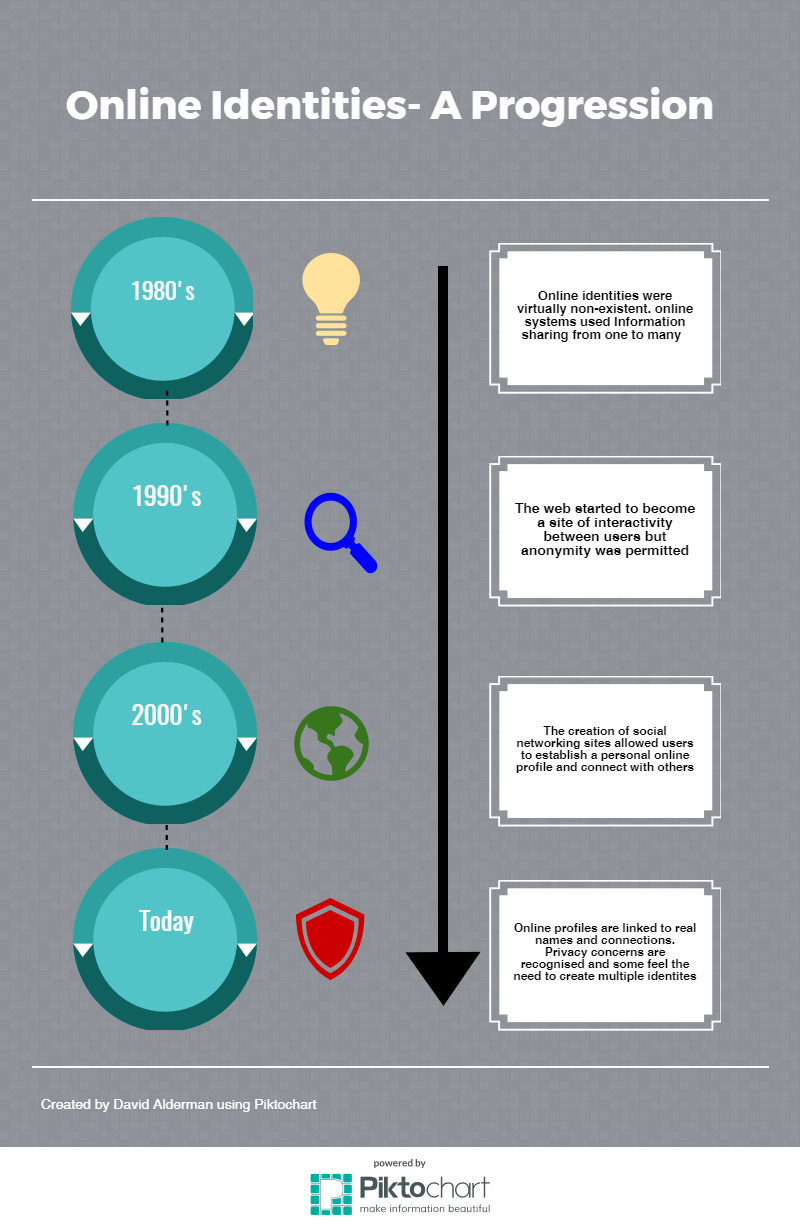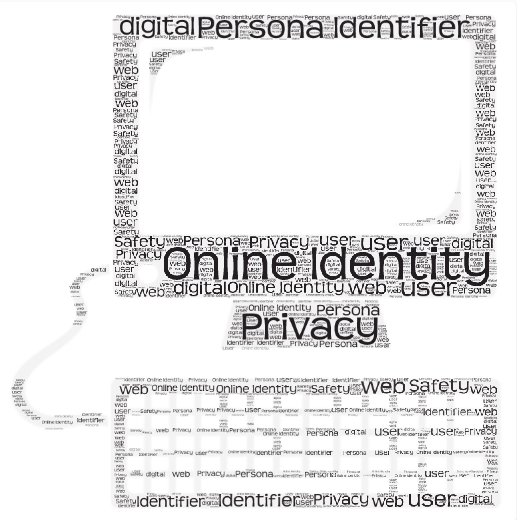As our globalized world continues to flourish and new online systems emerge, the gap between which we can separate our online persona from our real-life activities is decreasing (Costa and Torres,2011).In the 1990’s web user remained anonymous through concealed identities, however, the creation of social networking sites and the formation of personal online profiles places our personal information to a public setting and puts our online activities under surveillance (Krotoski, 2012). As issues over the protection of our online persona grows, some people have started adopting multiple online identities in order to establish a distinction between professional and personal livelihoods (DiMicco and Millen, 2007).
Figure 1 
Multiple online identities
One of the benefits to the creation of multiple identities is that it allows us to categorize different attributes of our personality to a distinct persona. This is important in maintaining a healthy working reputation, detached from our social activities (DiMicco and Millen, 2007).In the Ted Talk below, Mario Rodriguez discusses the monitoring of potential employees to a company by analyzing their social network background to assess if they are an appropriate candidate for the job. Rodriguez mentions that inappropriate online content on networking sites reviewed by the employer may discourage them from hiring the applicant, or lead to the loss of jobs for already employed individuals.
Continuing from the theme above that multiple identities allow different facets of our personality to be expressed, is the idea that an anonymity identity permits the user a certain amount of control over their creative outputs (Krotoski, 2012).Online environments often involve the participation in niche private interests that are not always publicly understood. a hidden identity therefore allows the user to explore their unique online hobbies without fear of scrutiny from others (Krasnova et al, 2009)
Figure 2

Issues with multiple identities
Multiple online identities, however useful, are critiqued for the burden they provide to user in having to manage more than one virtual persona. Not only can this prove to be time consuming, it also may create a personal identity crisis for the individual by causing them to question what online identity is an accurate representation of their offline self (DiMicco and Millen, 2007). Partnered with this, by acquiring multiple identities people may be seen as untrustworthy by not revealing their true identities (Known as “Cat fishing”), limiting the opportunity to establish meaningful online relationships with other users (Peterson, 2013).
Word count: 394
References
Costa, C. and Torres, R. (2011). To be or not to be, the importance of Digital Identity in the networked society. Revista Educacao, Formacao & Technologias
DiMicco, J. M., & Millen, D. R. (2007, November). Identity management: multiple presentations of self in facebook. In Proceedings of the 2007 international ACM conference on Supporting group work (pp. 383-386). ACM.
Hayley Peterson (2013) Daily mail Article, Catfishing:’ The phenomenon of Internet scammers who fabricate online identities and entire social circles to trick people into romantic relationship
Krasnova, H., Günther, O., Spiekermann, S., & Koroleva, K. (2009). Privacy concerns and identity in online social networks. Identity in the Information Society, 2(1), 39-63.
Krotoski, A. (2012). The Guardian, Online identity: is authenticity or anonymity more important?.
Rodriguez. M (2013) YouTube Video, Facebook Privacy & Identity – Exploring your digital self
The internet society- Online identity
Image references
Figure 1: Self-made using Piktcochart – https://magic.piktochart.com/dashboard
Figure 2: Self-made using Tagul- https://tagul.com/
Hi David,
I really enjoyed reading your blog post – I found it to be really informative, original and concise. I found that your point about identity crises stood out to me, as it’s something I had not thought about while researching this topic. It technically implies that a ‘mental health concern’ of sorts can be attached to this idea of multiple online identities (Barnes and Shardlow, 1996). I took this idea and decided to do a bit of further research, and came across a really interesting BBC Radio 4 podcast (http://www.bbc.co.uk/programmes/b07tqvvp). It discusses the rise of technology and our digital personas, this podcast too raising ideas and concerns that I hadn’t thought about. With health concerns being implicated within the 21st century online landscape, do you think new laws, or stronger law enforcement, could be a solution to protect those vulnerable to the concept of multiple online identities?
Thanks!
Madeleine
(word count: 153)
Reference: Barnes, M. and Shardlow, P. (1996) ‘IDENTITY CRISIS: MENTAL HEALTH USER GROUPS AND THE “PROBLEM” OF IDENTITY’, in Barnes, C. and Mercer, G. (eds.) Exploring the Divide. Leeds: The Disability Press, pp. 114–134.
LikeLike
Hi Madeleine,
Thanks for taking the time to read my blog, and for your interesting comment! I’m really glad you picked up on the connection between online identities and mental health, having recently completed my dissertation on the links between mental well-being and the use of social media among young people, it’s definitely a field I have an interest in. The BBC podcast that you recommended was extremely insightful and added an extra dimension to the themes of identity crisis that I hadn’t considered, namely, that the protection to the “fundamentals of self” is crucial in avoiding conflicting ideals and the misuse of the digital person. In regard to your question concerning the enforcement of laws in order to protect vulnerable individuals, I believe personally that stronger laws would be difficult to both implement and enforce. Instead, I feel that vulnerable people could benefit from flexible online support networks as an improvement to their mental health, as appose to rigid laws that may be met with resistance. I do believe, however, that online users require a better understanding of how their personal data is used in order to improve their privacy and peace of mind.
Thanks, David
LikeLiked by 1 person
Hi David,
Having read your post, I feel that the use of the infographic was very appealing and complimented the rest of your blog nicely. Much of your points were written in a concise manner and followed up with good references which made it much easier to read.
Having spoken about employability in my blog post, I found the video very reassuring to see that it highlights the importance of monitoring your online identities and being careful so as to not post any inappropriate content.
I’m interested to hear your opinion on how you think it’s best to present your online profile and would you be happy for employers to come across yours? Also, have you ever thought about how people can create fake profiles in order to seek comfort when they are afraid to use their real photo?
Thanks,
Carolina
LikeLike
Hi Carolina,
Thanks for taking the time to read my post, and for your positive feedback. In answer to your initial question, I feel that the presentation of your online profile should, where possible, attempt to avoid the distribution of content that can be deemed as offensive or controversial. I find this to be particularly important when using online platforms that may be viewed publicly, such as Facebook. In order for freedom of expression, however, I believe that it is entirely within reason to create multiple online identities in order to establish a distinction between professional and personal life, providing that the various identities can be easily managed and are not attempting to intentionally deceive other users. Personally, I would have no issue with employers viewing my online profile as I find it to be an appropriate accumulation of my professional and social life, supported by adequate privacy settings. Your last question raises an intriguing point, and something I had not considered. I feel that the creation of a fake profile could be potentially beneficial to online users that may have personal self-esteem issues, acting as a platform for comfort and expression without judgement from others. As mentioned previously however, the use of a fake profile should not deliberately attempt to mislead other online users.
Thanks, David
LikeLiked by 1 person
[…] the (simplified) foundations of the topic for me before diving right into the literature. Both David and Rachel’s posts stood out to me, as they offered new points I hadn’t considered in regards […]
LikeLike
[…] My comments can be viewed here: Louise, Caiti, David […]
LikeLike
[…] Harriet with a daily mail article that emphasised cases of this injustice. In a similar vein, Carolina made me consider my own online identity, asking if I would be happy to have my online profile […]
LikeLike